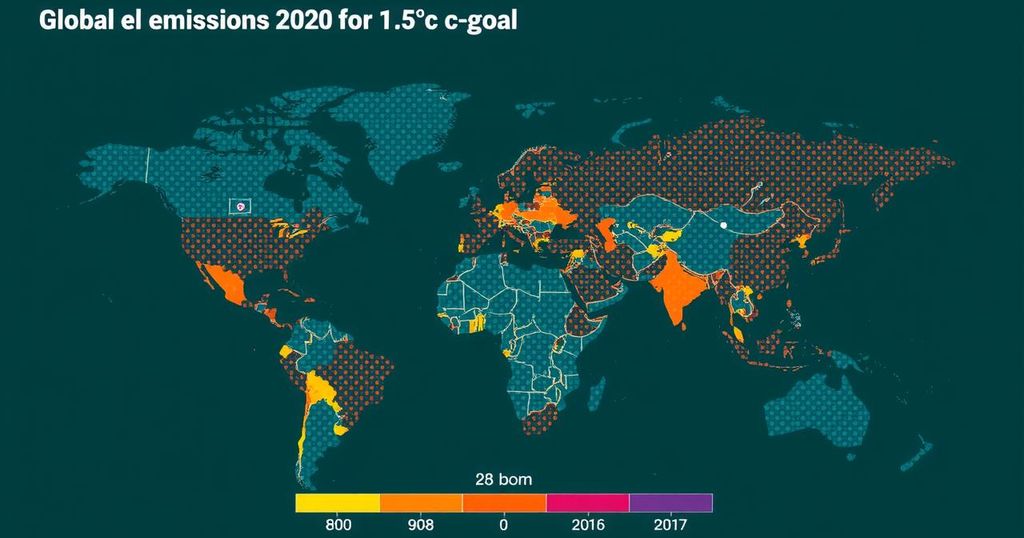Urgent Call for Enhanced Climate Pledges to Avert Global Warming Crisis

A recent UNEP report warns that nations must significantly increase their climate commitments by cutting greenhouse gas emissions by 42% by 2030 and 57% by 2035 to stay within the 1.5°C target set by the Paris Agreement. Without these measures, global temperatures are projected to rise between 2.6°C and 3.1°C, leading to severe impacts on the environment, economies, and public health. The report emphasizes the necessity of swift action and heightened ambition from all countries, particularly those within the G20, to prevent the escalation of the climate crisis.
Nations worldwide are urged to significantly enhance their climate pledges to address the growing crisis of climate change. As outlined in the latest UN Environment Programme (UNEP) report, nations must aim to reduce greenhouse gas emissions by 42% by 2030 and by 57% by 2035 to align with the Paris Agreement’s target of limiting global warming to 1.5°C. Failure to achieve this ambitious reduction could lead to global temperatures soaring between 2.6°C and 3.1°C, resulting in catastrophic impacts on ecosystems, economies, and human life. The report, titled “Emissions Gap Report 2024: No more hot air … please!”, is a clarion call for countries to submit updated Nationally Determined Contributions (NDCs) by early next year, prior to the COP30 climate negotiations in Brazil. The current trajectory indicates that without increasing the ambition of these NDCs, the world will likely experience unprecedented temperature rises. Actions taken to implement current NDCs could yield a temperature rise to about 2.8°C, while adhering strictly to existing policies alone may result in an alarming 3.1°C increase. UN Secretary-General António Guterres emphasized the urgency of closing the emissions gap and linked the rise in global emissions to the intensification of climate-related catastrophes, stating, “The emissions gap is not an abstract notion…There is a direct link between increasing emissions and increasingly frequent and intense climate disasters.” Inger Andersen, UNEP’s Executive Director, noted the pressing need for global mobilization, urging nations to utilize the forthcoming COP29 talks in Azerbaijan to significantly bolster their climate actions, with a stark warning: “Climate crunch time is here. We need global mobilization on a scale and pace never seen before—starting right now.” Despite the challenge, the report highlights that there remains potential to achieve the 1.5°C target through significant emissions reductions, estimated at up to 31 gigatons of CO2 equivalent by 2030 and 41 gigatons by 2035, at a relatively low cost. Transitioning to renewable energy sources and improving energy efficiency can contribute substantially to those reductions. However, accomplishing these goals demands an unprecedented level of international investment and cooperation, with an estimated annual investment of US$0.9 to US$2.1 trillion required until 2050. Finally, as the G20 nations are responsible for over 77% of current emissions, they bear the critical responsibility of leading the charge in enhancing climate ambition and policy implementation to avert catastrophic outcomes.
The urgency of addressing climate change has reached a critical point, necessitating immediate global action to reduce greenhouse gas emissions. The Paris Agreement, which aims to limit global temperature increases to below 2°C, preferably 1.5°C, sets the framework for countries to make measurable contributions through Nationally Determined Contributions (NDCs). However, recent assessments indicate a significant gap in the commitments made by nations, threatening to accelerate global warming beyond critical thresholds. The UNEP’s latest report serves as a stark reminder that without renewed and intensified efforts, the climate crisis will have severe implications for humanity and the planet.
The UNEP report underscores a pivotal moment in the global fight against climate change, revealing the necessity for immediate and substantial reductions in greenhouse gas emissions. It is imperative for nations to come together to ensure that updated NDCs reflect the urgency of the situation, aiming for a 42% reduction by 2030 and 57% by 2035. The stark warning from the report calls for global cooperation, mobilization of resources, and innovative solutions to avert the most disastrous consequences of climate change while safeguarding the planet’s future.
Original Source: phys.org






